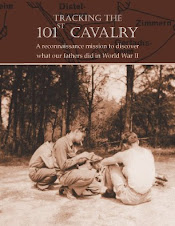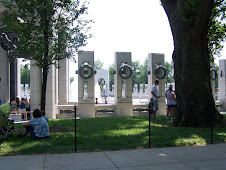Martin Lohmann teaches
English and history at Staffelsee-Gymnasium in Murnau, a small city in Bavaria.
The odds that he and I would ever just run into each other are probably
astronomical, but we did. We ran into each because of a common interest in
history, specifically the history of World War II. We both had come to that
interest through family members who fought in the war: my
father and two of Martin's grandfathers.
“History has always been so much more than a teaching matter
to me, with my main focus on World War II," said Martin. "With one of my grandfathers
surviving the war with what is commonly referred to as a “million-dollar wound,”
and the other taking part in all the main theatres of war, but only narrowly
escaping death on at least three occasions, plenty of innocent interest was triggered in me as a young boy. It was only much later that I acknowledged the
terrors that my grandmothers and parents had to endure in the bomb shelters in
Hamburg. In the ’80s, older gentlemen with limbs missing were such a common
sight that, unfortunately, it took years to realize that this generation has
stories to tell that need to be preserved.”
 |
| Murnau 2006 |
Martin began
interviewing local war veterans in 2008 and soon realized he was living near a
site that needed more research. He passed by Werdenfels Kaserne, a military
base in Murnau, quite frequently on his way to a local fast food restaurant.
“You could tell that its architecture revealed a history of more than 70
years,” he said. “It was within one of my extracurricular history seminars in 2008 that
one of my students wrote about Oflag-VIIA, also displaying Alain Rempfer’s pictures
that he had found online. Ever since, I have become more and more interested in
the history of the POW camp, with many hours spent in the local archives and
slowly getting into touch with descendants of the Polish officers in held
captive there.”
Among the descendants of the Polish officers held captive at Murnau is where our paths crossed. My father's troop was part of the liberation of the camp, and I also had been in touch with the children and grandchildren of the prisoners. At some
point, my name turned up on his radar, and he contacted me.
Martin and his students have been doing some exciting things in Murnau. In February 2014, they held an exhibition
about the end of the war in the region, an exhibit which attracted more than 1,000
visitors. One room of the exhibit focused on Oflag-VIIA, with many original
exhibits, barred windows, and a uniformed German Unteroffizier doing his paper work, the originals of which were on display
as well.
“There was a lot of
positive feedback on the exhibition and many residents praised us for dealing
with a topic that had been ignored for almost 70 years,” said Martin. “It is
only now that Murnau starts working on its National Socialist past, and I am
proud to do my part in this effort.”
Now Martin is
organizing a celebration for the weekend of April 24-26, 2015, (exact date of the event will be determined soon) commemorating the Oflag’s
liberation 70 years ago. Both the date and the program have been approved by,
and are strongly supported by, the Polish consul, the Murnau town hall and the
mayor, the army commander of Werdenfels Kaserne, the archive, and the principal of Staffelsee-Gymnasium Murnau.
Martin is hoping that
some surviving Polish officers and U.S. soldiers who were present at the liberation will
be in attendance at the celebration, as well as their descendants.
“We are very much looking
forward to receiving our guests of honor,” he said. “Those who are historically
and emotionally connected to Oflag-VIIA.”
The program will include a church mass held in several
languages and a guided tour of the Oflag buildings, walls, and attics, which have
remained untouched since 1945. After a ceremony at the Polish war graves, guests
can attend an Oflag exhibition. A number of presentations by Polish,
American, and German respresentatives are planned, as well as short films and
music of different nationalities.
Please take
some time to learn more about this important event in the history of the 101st
Cavalry. I have several pages dedicated to it on my website,
including two short videos.





No comments:
Post a Comment